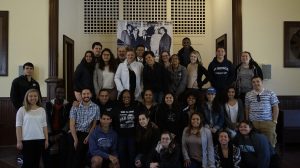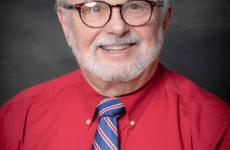By Wilmaris Soto | Staff Writer
This spring break, I had the opportunity to embark on a journey that I will forever remember.
I, along with 30 other students, went down South to follow the brave, resilient steps of the Civil Rights leaders. We went from North Carolina all the way to Selma, AL, Birmingham, AL, Montgomery, AL, and Nashville, TN. We were able to meet one of the original freedom riders and one of the original freedom singers, along with other inspiring people who took part of the movement.

Throughout this trip, I couldn’t help but think of the new ideas that I would bring back to Salve. This led me to reflect on the panel discussion that we had during Salve’s Multicultural Week, specifically the open dialogue on diversity, which was yet another wake up call about how much work we have ahead of us in confronting racism in out country.
As a woman of color, sitting front seat listening to our panelist discuss such a delicate subject filled me with different emotions. I felt excited and inspired that students are willing to have this talk, and at the same time I felt scared and apprehensive of what I might hear.
All the racial tensions occurring in our country have made the “race talk” almost impossible to ignore, which is why I felt a responsibility to attend this panel discussion. I thought, “this is great that we are doing this, that Salve is taking a stand.” However, I knew that there would be tension among the panelists because of their diverse backgrounds and ways of thinking.
I did not expect to be filled with more anger and hopelessness. As the panelists disagreed on topics like affirmative action, I could not help but tear up along with a classmate of mine who was also very emotional throughout the discussion. When students say things like “you cannot talk about race with emotion,” we, as students of color, hear: “you are not important and neither are your experiences.” Whether or not this was the intention of the panelist who said this, this kind of talk is harmful.
Needless to say, this talk was important, but it was not what I would have hoped to hear. Unfortunately, it left many pained and angry while others celebrated what certain panelists said. If we are going to have such talks, we need to make sure we are fully educated on our points of reference and that we are willing to listen, really listen.
This is a hard subject and for some it is merely the “other” experience, therefore it is easy to control their emotions and talk about race with such objectiveness; however, others cannot. In closing, I’d like to propose another open dialogue with a smaller group where people can really talk, listen to one another, and learn.














